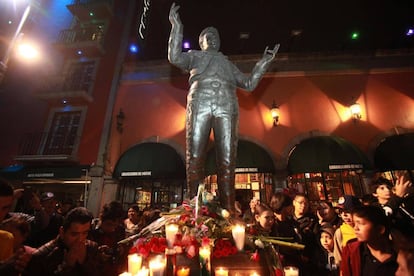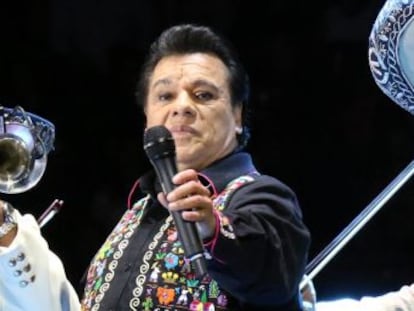Bigger than his music
Things I learned by traveling to Mexico: never, under any circumstances, even if you are surrounded by hipsters and metal-heads, make fun of Juan Gabriel

Things I learned when i traveled to Mexico: never, under any circumstances, even if you are surrounded by hipsters and rockers, make fun of Juan Gabriel. El Divo de Ju¨¢rez gave the entire country its emotional education with his songs, and Mexicans lapped up the story of a young boy who pulled himself up to the big time from nothing. And never make a joke about his sexuality.
Juanga, as he was known, also came to symbolize the chasm that existed between those who maintained the vision of a republic with a rigid class system and those who embraced reality. That conflict boiled over when Juan Gabriel was chosen to perform at Mexico City¡¯s Palacio Bellas Artes, within those walls adorned with works by Rivera, Siqueiros and Orozco. It was a great big fuss. Some saw the performance as a desecration of the place, the triumph of the Televisa aesthetic.
Carlos Monsiv¨¢is defended him valiantly. Monsiv¨¢is, an astute observer of Mexican culture, wrote a book about the singer, Escenas de pudor y liviandad (1981), in which he chronicled how the effeminate performer had won over the love of a country that was almost a caricature of sexism and chauvinism. And as despicable as Televisa and some other media outlets were, Monsiv¨¢is argued, some genuine talents did flourish on those platforms.
Juan Gabriel was moderate that night in 1990. It¡¯s true that he later let loose and filled that sacred hall with a troupe of mariachis, choristers and dancers (no, he was not big on subtlety).
I finally met him in Barcelona at an award ceremony. He seemed hurt that he was not being treated as what he really was: the biggest star at the event. He had a venomous tongue that always hit its target. But then, he calmed down. It turned out that we had friends in common, such as the producer Jorge ?lvarez.
?lvarez started telling stories and would not stop. They traveled together through small towns in the interior of Mexico where Juan Gabriel performed in cockfighting pits between two matches and the occasional shoot-out. But the singer-songwriter always restored peace. He was, literally, above good and evil. According to ?lvarez, when he traveled to the United States on his private jet, American police officers ¨C many of them with Hispanic last names ¨C would pay their respects.
Juan Gabriel was the dam that halted the flood of English-language music. He added new songs to the ranchera, bolero and balada songbooks. Later in his career, he even accepted rock music. One of his last recordings was an adaptation of Have you ever seen the rain? by Creedence Clearwater Revival. Fogerty¡¯s fatalistic musing on life¡¯s changing seasons had become an insipid anthem about the sun.
But then, that was Juanga...
English version by Dyane Jean Fran?ois.
Tu suscripci¨®n se est¨¢ usando en otro dispositivo
?Quieres a?adir otro usuario a tu suscripci¨®n?
Si contin¨²as leyendo en este dispositivo, no se podr¨¢ leer en el otro.
FlechaTu suscripci¨®n se est¨¢ usando en otro dispositivo y solo puedes acceder a EL PA?S desde un dispositivo a la vez.
Si quieres compartir tu cuenta, cambia tu suscripci¨®n a la modalidad Premium, as¨ª podr¨¢s a?adir otro usuario. Cada uno acceder¨¢ con su propia cuenta de email, lo que os permitir¨¢ personalizar vuestra experiencia en EL PA?S.
En el caso de no saber qui¨¦n est¨¢ usando tu cuenta, te recomendamos cambiar tu contrase?a aqu¨ª.
Si decides continuar compartiendo tu cuenta, este mensaje se mostrar¨¢ en tu dispositivo y en el de la otra persona que est¨¢ usando tu cuenta de forma indefinida, afectando a tu experiencia de lectura. Puedes consultar aqu¨ª los t¨¦rminos y condiciones de la suscripci¨®n digital.










































